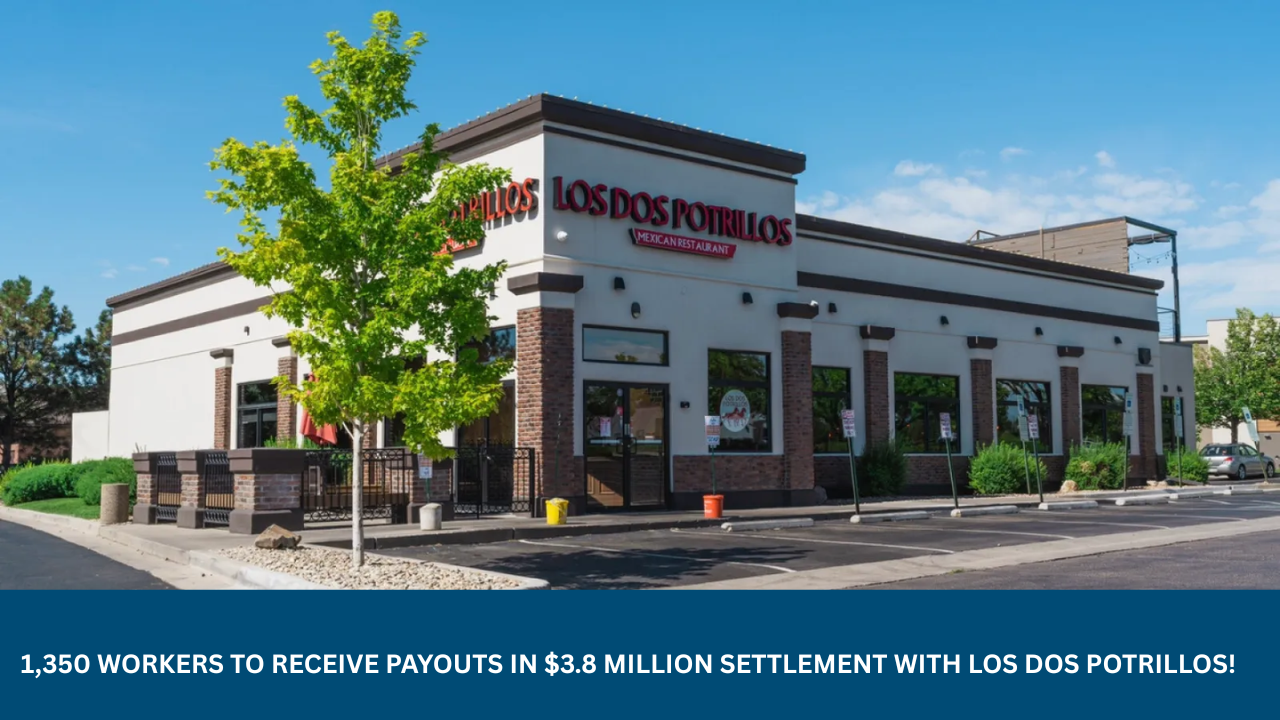Los Dos Potrillos, a popular Mexican restaurant chain, has agreed to pay $3.8 million to settle a class-action lawsuit that accused it of underpaying and overworking its employees over seven years. The lawsuit, which covered workers employed at the restaurant chain between 2017 and 2024, accused the company of failing to pay the minimum wage, not compensating workers for overtime, improperly splitting tips, and not providing adequate rest breaks.
The proposed settlement, which still requires approval from a federal judge, will see Los Dos Potrillos pay $2.1 million directly to the 1,350 affected employees. The remaining funds will be allocated to cover legal fees and other costs associated with the case. The payouts, which will be distributed based on the number of hours worked and employees’ salaries, range from $25,677 to as little as $65.
A Hard-Fought Settlement for Workers
“We are very pleased that we were able to secure such a favorable settlement for these workers,” said Brandt Milstein, the attorney representing the employees. Milstein and his legal team have worked tirelessly on behalf of the workers, fighting to ensure they receive compensation for their long hours and the mistreatment they allegedly suffered while working at Los Dos Potrillos.
The legal battle began in early 2023 when former server Gladis Castañeda filed the lawsuit against the chain. Castañeda claimed that the restaurant chain violated federal labour laws by not paying employees the minimum wage, failing to compensate for overtime, and improperly splitting tips. She also accused the company of failing to provide proper rest breaks. The case was eventually expanded into a class-action lawsuit to include all hourly workers employed at Los Dos Potrillos from 2017 to 2024.
Background of Los Dos Potrillos
Los Dos Potrillos was founded in 2002 by Jose Ramirez, who opened the first location in Centennial, Colorado. Over the years, the chain expanded into several other cities in the southern part of the Denver metro area. In 2019, Ramirez handed over the reins of the business to his sons, Daniel and Luis Ramirez, who have continued to expand the brand. Despite the family’s success in growing the business, the wage theft lawsuit has tarnished the chain’s reputation, placing it under scrutiny.
While the Ramirez family has continued to open new locations, including one in Denver earlier this year, the legal troubles related to employee compensation have raised concerns about the company’s labour practices. The lawsuit served as a reminder of the importance of following fair labour practices, especially for businesses that operate on a large scale.
The Legal Process and Settlement
The lawsuit unfolded over several months, involving two formal mediation sessions and multiple informal discussions. Both sides were able to reach an agreement, but not without some contention. “This was a contested negotiation, and at times, it was contentious,” Milstein explained during a hearing with U.S. District Judge Daniel Domenico, who is set to approve the settlement.
Milstein expressed that the settlement was a more valuable outcome than a prolonged trial. The settlement allows workers to receive compensation for unpaid wages, overtime, and tips, as well as other benefits they were denied while working for the restaurant chain.
Christian Gunneson, the attorney representing Los Dos Potrillos, argued that the claims made against his clients were still just allegations. Gunneson, who works with Freeman Mathis & Gary, a national law firm, emphasised that there had been no proven wrongdoing by the restaurant chain. However, he acknowledged that the settlement would provide a quicker resolution for all parties involved.
Ramirez Family’s Response
In response to the lawsuit, the Ramirez family, which now operates Los Dos Potrillos, stated that their company is the Ramirez Hospitality Group. They expressed their commitment to core values, including respect, integrity, safety, and excellence in their operations. They also cited their 70% employee retention rate as evidence of their positive work environment.
Despite their statement, the family did not elaborate on the specifics of the lawsuit or provide further comment on the ongoing legal process. The case has undoubtedly affected the public image of Los Dos Potrillos, but the family has attempted to maintain a positive reputation by emphasising their commitment to their employees.
Compensation for Workers
Under the settlement, workers affected by the wage theft will receive compensation based on their individual hours worked. The total amount allocated for workers is $2.1 million, which will be divided among the 1,350 affected individuals. The highest payouts are expected to be approximately $25,677, while the smallest payouts may only be around $65.
The settlement provides financial relief to the workers who were impacted by the alleged illegal practices at Los Dos Potrillos. While the settlement may not fully compensate for the hardship caused by wage theft, it ensures that employees will receive compensation for the hours they worked and the tips they earned, but were not properly compensated for.
Looking Forward
This settlement marks the culmination of a lengthy legal battle and serves as a cautionary example for other businesses in the restaurant industry. It highlights the need for companies to comply with labour laws and treat their employees fairly. The case also demonstrates the power of class-action lawsuits, enabling employees to unite and fight for justice when confronted with widespread illegal practices.
For the Ramirez family and Los Dos Potrillos, the settlement is an opportunity to put this chapter behind them and focus on the future. While their expansion plans remain on track, they must now work to regain the trust of both their employees and their customers.
Conclusion
The Los Dos Potrillos case serves as a reminder of the importance of fair labour practices and the need for businesses to comply with the legal requirements that protect workers. The settlement provides a measure of justice for the workers who were mistreated over the years, allowing them to receive the compensation they deserve. It also offers a cautionary tale for other businesses, emphasising the potential legal and financial consequences of failing to pay workers fairly.




